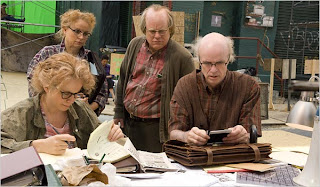“God” is the label that we affix to what we believe to be most important.
For some, there is more than one God. Integrity is not possible in this context.
For some, there is no coherence in what is desired, merely a living moment to moment. There is no integrity possible here, in a more obvious manner.
For most, however, there is a desire for some sort of integrity, for the experience of a life knitted together and formed by the pursuit of a higher purpose.
It has to be a _higher_ purpose; our own wills and desires are not a sustainable diet and soon become jaded. In other words, in order to generate a life-long sense of vocation, personal growth, maturity in love etc etc there has to be something transcendent about what is pursued. Some sense that it has value independent of what any of us happen to think about it, even, perhaps essentially, that there needs to be some sort of internal struggle in order to attain or achieve what that value might be.
This is the spiritual path. This is learning to see the world truly. This is learning to desire one thing.
For some, that one thing may be completely secularly explainable – say, pursuing the agenda of Amnesty International whole-heartedly. Yet for any identifiable value I believe it fairly straightforward to generate situations where that identifiable value comes into conflict with other similar values.
It seems to me that it is only a religious tradition – specifically, it is only a religious tradition which has a place for the apophatic – that can generate the intellectual resources which enable the higher values to be pursued with integrity.
In other words, and succinctly, I do happen to believe that it is not possible to be “moral” (= pursue a path of personal integrity) without a properly formed belief in and worship of “God” (= transcendent source of value with intellectual tradition enabling the exploration of the same).





